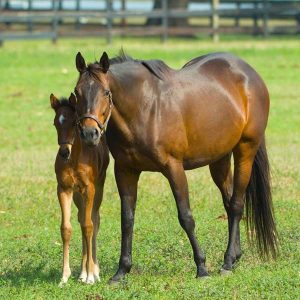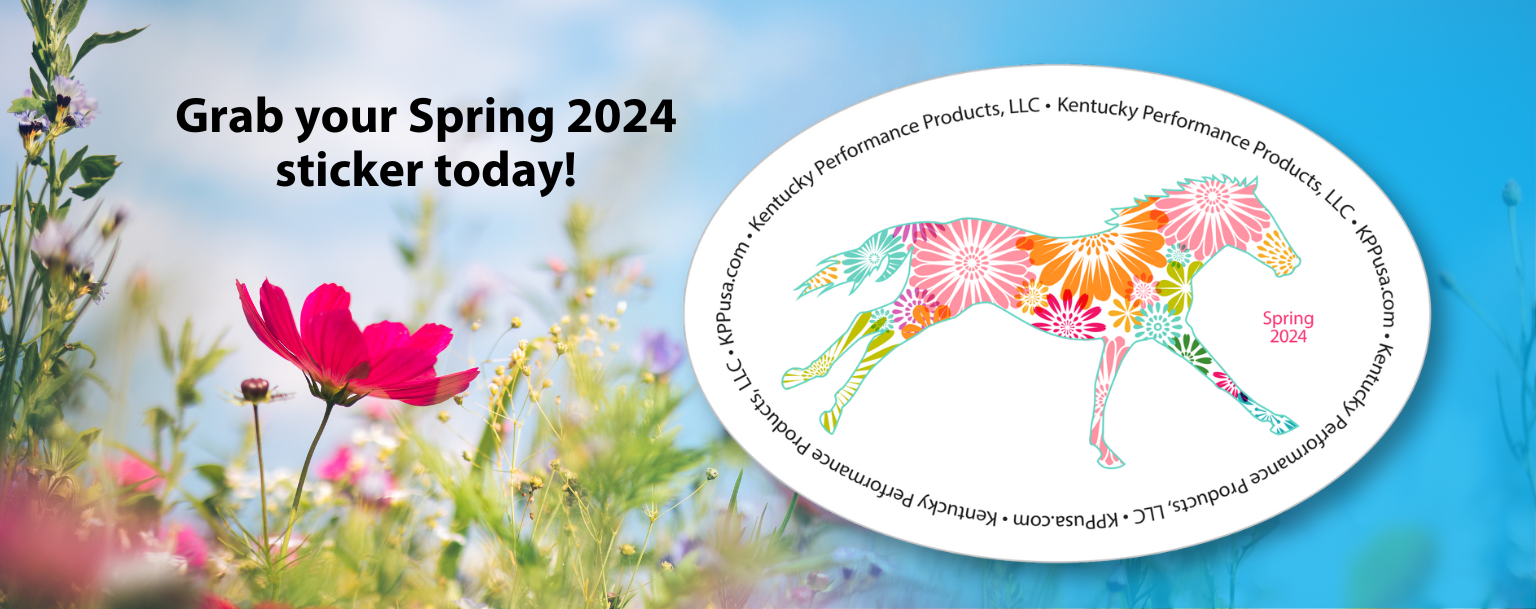
Ensure Reproductive Efficiency
Elevate® and the breeding horse
Vitamin E is an essential component of body-wide antioxidant defenses. These defenses play a vital role in ensuring healthy immune, cardiovascular, and reproductive function in the horse. As increased demands are placed on horses during breeding season, one can justify the added benefit of supplemental vitamin E to the mare, foal, and stallion.
Natural vs. synthetic vitamin E
The most common source of vitamin E used in animal feeds is synthetic dl-alpha-tocopheryl acetate. Made from petrochemicals, synthetic vitamin E (dl-alpha-tocopherol) is not as biologically potent as natural vitamin E. An alternative, natural form of stable vitamin E is d-alpha-tocopheryl acetate.
There are physiological differences in the absorption, utilization, and tissue retention between synthetic and natural vitamin E. In fact, the body preferentially transports and incorporates into tissues natural vitamin E. Current research in several species, including horses, shows that natural vitamin E is two to three times more potent than synthetic.
Natural vitamin E, two options to choose from
The Elevate family of products was developed to meet your horse’s individual needs. Elevate W.S. liquid can raise your horse’s vitamin E status to the desired level quickly and efficiently. The new Elevate Maintenance Powder ensures, in an easy-to-feed and affordable manner, that vitamin E levels remain where you need them to be. Elevate W.S. is sold through veterinarians only. Elevate Maintenance Powder is available at retail stores in your area or in our online store.
Water-soluble vitamin E is most effective
The vitamin E in Elevate W.S. is water soluble, which allows it to be absorbed efficiently from the gastrointestinal tract. Because of this rapid absorption, vitamin E is readily dispersed into the blood and to outlying tissues. When other forms of vitamin E are fed (e.g., oil-based or emulsified forms), the digestive system must break down the vitamin E before it can be used, thus delaying absorption.
Assessment of vitamin E status is accomplished by measuring levels in plasma. Kentucky Equine Research compared the vitamin E levels of horses consuming three types of vitamin E: synthetic vitamin E acetate, natural vitamin E acetate, and natural, water-soluble vitamin E. Dramatic increases were noted in horses fed natural, water-soluble vitamin E. From baseline values, blood levels rose an astonishing 207% when horses were given 8,000 IU. This study also showed that plasma levels fell slightly when horses were fed synthetic vitamin E.
Elevate® for the broodmare and foal
Researchers have recently investigated the value of vitamin E in mares. When supplemented with vitamin E, mares show increased passive transfer of antibodies to foals, which ensures the strength of the neonatal immune system. Foals that do not consume enough colostrum or receive only poor-quality colostrum often have failure of passive transfer, where an inadequate immunoglobulin intake can lead to sickness and death.
In a study conducted at the University of Connecticut, scientists showed an advantage of feeding vitamin E to late pregnant and early lactating mares. Serum and colostrum antibodies were greater in mares that received higher levels of vitamin E. After nursing, the foals from mares fed more vitamin E had higher serum levels of antibodies, which was reflective of their dams’ colostrum.
According to a study, mares supplemented with Elevate W.S. before foaling exhibited higher vitamin E levels, as did their foals, at 12 to 36 hours after birth. Increasing evidence suggests that vitamin E supplementation may boost fertility in mares. Supplementation will increase circulating levels of vitamin E and may positively affect fertility, especially in mares with reduced uterine defense mechanisms.
A similar study in Sweden showed that gestating mares supplemented with 1,500 IU of water-soluble natural vitamin E per day for 21 days before foaling had higher plasma alpha-tocopherol at foaling. Foals from these mares had higher vitamin E status at 12 to 36 hours after birth. The higher plasma tocopherol levels in foals nursing supplemented mares was attributed to higher colostrum transfer of vitamin E.
Elevate® for the stallion
Vitamin E has been linked with increased libido and semen quality in stallions. In addition to these characteristics, one of the most important functions of vitamin E in stallions is cell membrane protection. The lipids in cell membranes are vulnerable to attack from harmful compounds known as free radicals or reactive oxygen species (ROS) that are produced in the mitochondria of cells. The body’s defense mechanisms against free radicals and ROS are enzymes and nutrients referred to as antioxidants. Vitamin E, a natural antioxidant, reacts with free radicals and ROS to protect cell membranes.
Research has suggested that fatty acids in sperm cell membranes are crucial to fertilizing capacity, so the nutrients that protect the fatty acids are just as important. Sperm motility is commonly used as an indicator of oxidative stress. Practices such as chilling, freezing, and shipping semen increase oxidative stress.
Under normal conditions, sufficient vitamin E is found in fresh forages and feeds. However, breeding places increased nutritional demands on the stallion and vitamin E requirements may not be met by common feeding practices. During the breeding season, supplemental vitamin E provides the stallion with higher circulating levels of antioxidants, thus creating an environment for sperm to remain strong and viable.
Increasing line of defense
Research has shown the benefits of supplemental vitamin E for the mare, foal, and stallion. With the introduction of Elevate to the equine marketplace, breeding farms now have the opportunity to provide the most bioavailable form of vitamin E to increase antioxidant protection and ensure maximal reproductive performance.
Recommended Use Rates of Elevate W.S.
- Maintenance: 1,000 IU/day
- Stalled horses or horses maintained on poor pasture: 1,000-2,000 IU/day
- Intense training: 3,000 IU/day
- Pregnant and lactating mares: 3,000 IU/day
- Foals: 3,000 IU/day
Recommended Use Rates of Elevate Maintenance Powder
- Maintenance: 1-2 scoops per day (1,000-2,000 IU vitamin E per day)
- Intense training: 3-5 scoops per day (3,000-5,000 IU vitamin E per day)
- Pregnant/lactating mares: 3 scoops per day (3,000 IU vitamin E per day)
- Foals: 3 scoops per day (3,000 IU vitamin E per day)
- Stallions: 3 scoops per day (3,000 IU vitamin E per day)
- Neurological challenges: Consult your treating veterinarian
References:
Hoffman, R.M., Morgan, K.L., Lynch, M.P., Zinn, S.A., Faustman, C., & Harris, P.A. Dietary vitamin E supplementation in the periparturient period influences immunoglobulins in equine colostrum and passive transfer in foals. Proceedings of the Equine Nutrition and Physiology Symposium, June 2-5, 1999, Raleigh, North Carolina.


